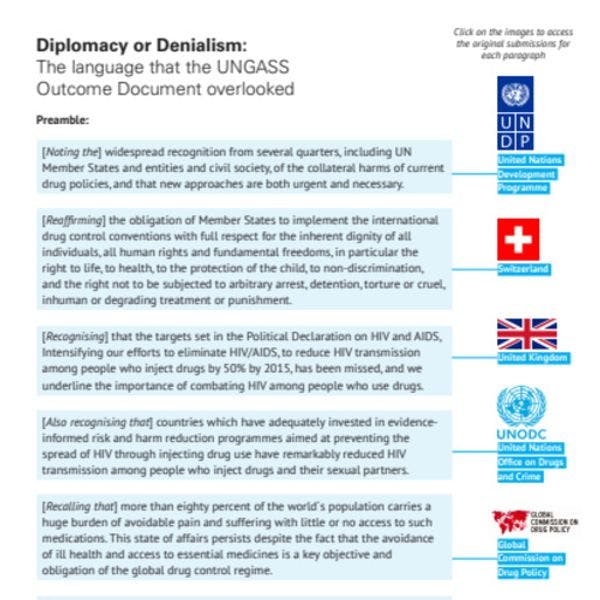Diplomacy or denialism? The language that the UNGASS Outcome Document overlooked
On 19th April 2016, 193 UN member states will come together at a UN General Assembly Special Session (UNGASS), and will formally approve an Outcome Document on “the world drug problem”. This document was finalised a few weeks ago by the 54 countries of the UN Commission on Narcotic Drugs (CND) in Vienna.
The document negotiations have been a fraught and difficult process of consensus-based decision making, and diplomatic horse trading taking place behind closed doors and excluding UN agencies, regional bodies and civil society. More than 100 member states, either not part of the CND or without permanent representation in Vienna – mostly from the Global South – played no role whatsoever in the negotiations. These member states will have no opportunity to debate the UNGASS Outcome Document draft at the UNGASS itself because, bizarrely, the document is set to be agreed at the beginning of the meeting.
Substantive contributions to the UNGASS process did, however, come from a wide range of stakeholders. But any proposed language that challenged the failings of the current system, or called for meaningful changes to the status quo, was systematically ignored, marginalised, vetoed, watered down or overlooked in the negotiations.
The attached document highlights just a small selection of the strong, progressive and evidence-based language on issues that are overlooked or insufficiently reflected in the Outcome Document. All of this language was on the table during the negotiations – submitted by member states, regional bodies, UN agencies and others.
Although the Outcome Document does include some good language on some points (such as access to essential medicines, development, overdose prevention and alternatives to incarceration), it could have been a very different document if the more progressive inputs had not been overlooked.
Ann Fordham, Executive Director of the International Drug Policy Consortium (IDPC), declared: “The UNGASS was called for by three Latin American countries who are desperate for a critical evaluation of the failings of the global war on drugs, and an open and honest exploration of the alternatives. But the Outcome Document does not do this. Instead it reflects the lowest common denominator consensus position that is almost entirely disconnected from reality”.
Steve Rolles, Senior Policy Analyst for the Transform Drug Policy Foundation, concluded “The UNGASS Outcome Document’s turgid restatement of ‘business as usual’ is a profound betrayal for the many stakeholders across the world who were promised real dialogue, new thinking and change”.
***********************
Please direct queries to:
- Ann Fordham, Executive Director, International Drug Policy Consortium, afordham@idpc.net, @annfordham, +44 7970 034810
- Steve Rolles, Senior Policy Analyst, Transform Drug Policy Foundation, steve@tdpf.org.uk, @SteveTransform, +44 7980 213943
Notes for media:
[i] The UN General Assembly Special Session on the World Drug Problem takes place in New York from the 19th to 21st April 2016. It was originally called for by Colombia, Mexico and Guatemala in 2012. At the time, these governments felt that an urgent debate on drug policy was needed.
[ii] The final Outcome Document can be accessed at: http://www.un.org/Docs/journal/asp/ws.asp?m=E/CN.7/2016/L.12/Rev.1
[iii] For more information on concerns about the UNGASS process, see: http://idpc.net/alerts/2016/03/civil-society-statement-on-the-ungass
Keep up-to-date with drug policy developments by subscribing to the IDPC Monthly Alert.
Topics
Regions
Related Profiles
- International Drug Policy Consortium (IDPC)
